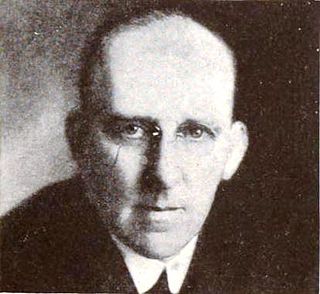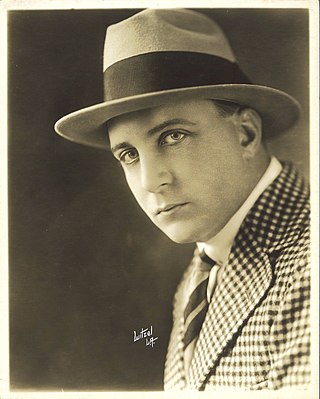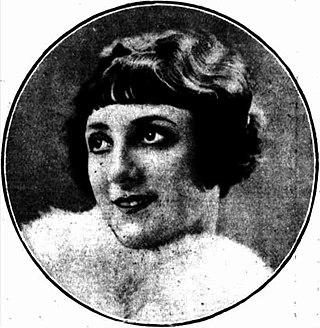Related Research Articles

Charles Eyton was an actor-producer who became general manager of Famous Players–Lasky Corporation during the silent film era.

The Kyarra was a 6,953-ton steel cargo and passenger luxury liner, built in Scotland in 1903 for the Australian United Steam Navigation Company.

Maggie Moore was an American-Australian actress born as Margaret Virginia Sullivan.

Lotus Thompson was an Australian actress of silent and sound films. Her film career began in Australia in 1921 and ended in California in 1949, during which time she appeared in 35 motion pictures. She died in California in 1963.

Frances Amy Lillian Sherwin, the 'Tasmanian Nightingale', was an Australian soprano singer.
Tasman (Tas) Jones was an Australian sportsman, well known as a swimmer and a diver. He also played water polo, rugby union, and rugby league.

Marie Louise Hamilton Mack was an Australian poet, journalist and novelist. She is most known for her writings and her involvement in World War I in 1914 as the first woman war correspondent in Belgium.

Arthur Shirley was an Australian actor, writer, producer, and director of theatre and film. He experienced some success as a film actor in Hollywood between 1914 and 1920.

Alfred Rolfe, real name Alfred Roker, was an Australian stage and film director and actor, best known for being the son-in-law of the celebrated actor-manager Alfred Dampier, with whom he appeared frequently on stage, and for his prolific output as a director during Australia's silent era, including Captain Midnight, the Bush King (1911), Captain Starlight, or Gentleman of the Road (1911) and The Hero of the Dardanelles (1915). Only one of his films as director survives today.
Walter Franklyn Barrett, better known as Franklyn Barrett, was an Australian film director and cinematographer. He worked for a number of years for West's Pictures. It was later written of the filmmaker that "Barrett's visual ingenuity was to be the highlight of all his work, but... his direction of actors was less assured".
The MacMahon brothers were entrepreneurs in Australian show business. Chief among them were James MacMahon and Charles MacMahon, who together and separately toured a large number of stage shows. Their younger brothers, Joseph and William, were involved in many of those activities.

Vera James Munro was a New Zealand actress who worked in theatre and film. In 1929 she appeared in the first all-talking, all-colour feature length movie ever made, Warner Bros On with the Show!, and was already well known for starring in A Girl of the Bush in 1921.
Alice Eyton, sometimes credited under her married name Alice von Saxmar, was a New Zealand–born journalist, screenwriter, playwright, and novelist active in Hollywood between 1918 and 1922.

Minna Pauline Fischer was an Australian lyric soprano and singing teacher in London.
Wilton Welch was an Australian comic actor and dramatist, husband and collaborator of Louise Carbasse, best known as Louise Lovely.
William Dind was an hotelier and theatre manager in Sydney, Australia, where he was the longtime lessee of the Royal Victoria, and Prince of Wales theatres. He settled on Sydney's North Shore, where he was active in local government, and he and his son William Forster Dind, aka W. Forster Dind or William Dind jun, ran hotels which were popular with theatrical people.

Vera Gladys Dwyer was an Australian novelist. She also contributed stories to magazines and newspapers.

Patti Russell was an Australian soprano singer, playing in grand opera and Gilbert and Sullivan for nine years (1919–1928) to universal acclaim. Little is known of her early life, or any subsequent activities.

Renee Evelyn Mary Lees was an Australian pianist, hailed as a child prodigy, later known as a theatre organist.
References
- ↑ "Musical Offering by Artists". Los Angeles Evening Express. 16 November 1912. Retrieved 19 March 2020.
- ↑ The Playgoer. Dawbarn & Ward. 1901.
- ↑ "Advertising". The Mercury . Vol. XL, no. 3786. Tasmania, Australia. 28 March 1882. p. 1 (The Mercury Supplement ). Retrieved 24 January 2024– via National Library of Australia.
- ↑ "Death of a Journalist". Tasmanian News. Vol. II, no. 591. Tasmania, Australia. 15 October 1885. p. 3. Retrieved 20 January 2024– via National Library of Australia.
- 1 2 "Vera Doria". The Lima News. 27 June 1915. Retrieved 19 March 2020.
- ↑ "Mr. Louis Grist's concert". The Australian Star . No. 3694. New South Wales, Australia. 15 December 1899. p. 2. Retrieved 24 January 2024– via National Library of Australia.
- ↑ "Miss Vera EYTON'S concert". The Evening News (Sydney) . No. 10, 540. New South Wales, Australia. 21 March 1901. p. 2. Retrieved 24 January 2024– via National Library of Australia.
- ↑ "Dramatic notes". Evening Journal. Vol. XXXIV, no. 9740. South Australia. 22 March 1902. p. 7. Retrieved 24 January 2024– via National Library of Australia.
- ↑ "Stageland". The Evening News (Sydney) . No. 11, 138. New South Wales, Australia. 21 February 1903. p. 3 (Evening News Supplement). Retrieved 24 January 2024– via National Library of Australia.
- ↑ "An actress's antics". Sunday Times (Perth) . No. 310. Western Australia. 13 December 1903. p. 12. Retrieved 24 January 2024– via National Library of Australia.
- ↑ "Soprano Is Lured Into the Movies". The Sunday Telegram. 27 June 1915. Retrieved 19 March 2020.
- ↑ "Club Does Honor to Opera Stars". Los Angeles Evening Express. 3 October 1912. Retrieved 19 March 2020.
- ↑ "Ex-Wife Left Fund by Eyton". The Los Angeles Times. 9 July 1941. Retrieved 19 March 2020.
- ↑ "Vera Doria's N.Y. Engagement". The Los Angeles Times. 31 August 1913. Retrieved 19 March 2020.
- ↑ "Sugar and Spice". The Los Angeles Times. 8 October 1933. Retrieved 19 March 2020.
- ↑ "Beautiful Russian is Co-Respondent". Arizona Daily Star. 24 August 1933. Retrieved 19 March 2020.
- ↑ Motography. 1916.